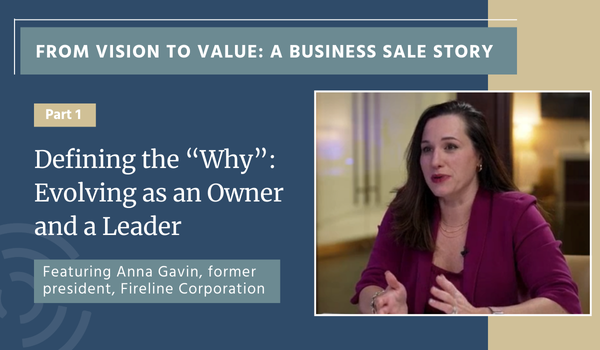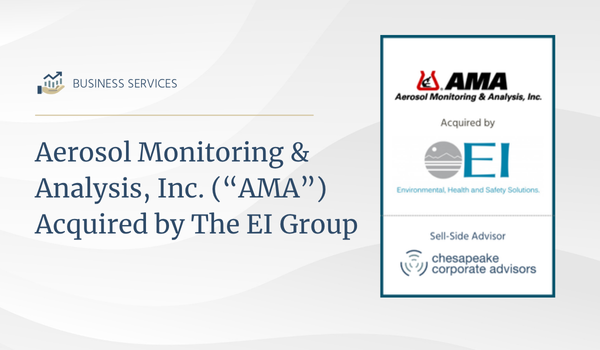As a business owner, you probably envision selling your company eventually and enjoying the fruits of your labor. What you probably do not envision is turning down an unsolicited offer to buy the business. After all, shouldn’t you accept the proverbial bird in the hand?
Not necessarily.
The Trouble with Unsolicited Offers
Unsolicited offers are common for businesses on a strong growth trajectory, with lower risk profiles or recurring revenue models that allow investors to project their returns confidently. And unsolicited offers are happening even in today’s unpredictable economic environment. Private equity (PE) groups still have capital to deploy—and strategic acquirers, including large middle-market or public companies, are using their balance sheets to finance deals.
If you receive an unexpected offer to buy your company, you might assume you have a quick, easy deal. But before you start counting the money, you need to understand why buyers make unsolicited offers. Some are just gathering intelligence about your market—its size, growth trends, and key players—with no intention to follow through with the acquisition. Other times the offer comes from a fundless sponsor, which is a buyer that looks for acquisition targets first, then attempts to line up the financing after.
Even if the buyer is legitimate and has the necessary capital in hand, an unsolicited offer is still fraught with problems.
- The buyer has all the leverage. No competition means one buyer holds all the cards. You now have no opportunity to compare or negotiate multiple offers against each other, and assuming the buyer requires exclusivity, you have essentially taken your business off the market.
- The offer price will only go down. Buyers that make unsolicited offers often dangle a big number with no intention of paying it. Throughout the due diligence process, particularly the “quality of earnings” review, their initial offer will keep dropping as you disclose more information.
- You risk losing your focus. Selling a business takes significant time and energy, especially if you do not have a deal team in place to relieve some of the burden. If an unexpected offer diverts your attention from running the business and your numbers suffer as a result, you could lose the current offer and have trouble attracting others.
What to Ask Yourself Before Moving Ahead
To avoid the risk of selling your business for the wrong price, at the wrong time, to the wrong partner, for the wrong reasons, you should carefully consider these questions.
- Is this the right time to sell, personally and professionally? Selling your company is one of the most important decisions of your life, so you should do it when the time is best for you—not the buyer. Consider whether you are ready to give up the daily responsibilities of running a company and whether the business is at the right point in its maturity to be sold.
- How does the offer align with your business valuation? Having a business valuation conducted periodically ensures you have a point of comparison if an unsolicited offer comes along. An offer that is significantly higher or lower than your most recent valuation can be a red flag.
- How does this offer compare to recent sales of comparable companies? While every business is unique, and you cannot make a direct comparison, it is helpful to know how much other businesses in your market have sold for.
- Is the buyer proposing to purchase all or part of the company? Sometimes it is advantageous to roll forward a portion of your equity in the company and stay on until the new owner grows the business and sells it—offering you a “second bite of the apple.” Even if that is the buyer’s intent, you need to be willing to forego some cash up front in exchange for a potentially bigger payout later.
- Could you be selling prematurely? A key metric in determining what your company will sell for is your 12-month trailing performance. If that figure does not reflect your current growth trajectory, you could be leaving money on the table by selling too soon.
- Does the deal structure work in your favor? The deal structure and terms are just as important as the purchase price. Some portion might be paid in stock (vs all cash), there could be earnouts that are only paid if the company hits certain targets over time, or you might be required to take a seller note as a portion of the deal consideration.
- Would the sale achieve an important objective for you? For instance, if much of your net worth is tied up in the company, as it is for many business owners, a partial sale could be an opportunity to mitigate risk and gain liquidity.
- What is the buyer’s plan for you and your management team? You’ll want to know whether the buyer expects you to stay on for a period of time and whether they plan to keep or replace your executive team.
- What will this mean for your legacy? After spending years building a business and a brand, you need to know and be aligned with the buyer’s plans for the company post-sale. Otherwise, you could be blind-sided if the new owner discontinues a key product line, closes an office, or makes other changes you do not agree with.
- Is this a legitimate buyer? You should vet the buyer just as they are vetting you, using publicly available sources to learn if they have a history of acquiring other companies and the capital to complete the sale.
One of the best ways to keep an unsolicited offer from taking you down the wrong path is to rely on a team of advisors with experience helping owners through the complex process of selling a business. That team typically includes an attorney and a CPA that both specialize in mergers and acquisitions, as well as an investment banker, wealth manager, and tax specialist.
Your deal team will help you evaluate an unsolicited offer in light of your answers to the previous questions. If you decide to move forward, they will value your business, prepare you for the due diligence process to avoid surprises, and help you obtain the best deal price and terms. Having a deal team represent you also can change the dynamics, shifting the buyer’s mindset so that they treat you more seriously.
With so much at stake when you sell your business, you cannot afford to let an unsolicited offer derail you from your personal and professional goals. Contact the experienced investment bankers at Chesapeake Corporate Advisors to learn how we can help.
About Chesapeake Corporate Advisors
Chesapeake Corporate Advisors is a boutique investment banking and corporate advisory firm providing strategic advisory services (value creation) and investment banking services (value realization) to companies with revenues between $10 million and $200 million. For more information, visit www.ccabalt.com or call 410.537.5988.





